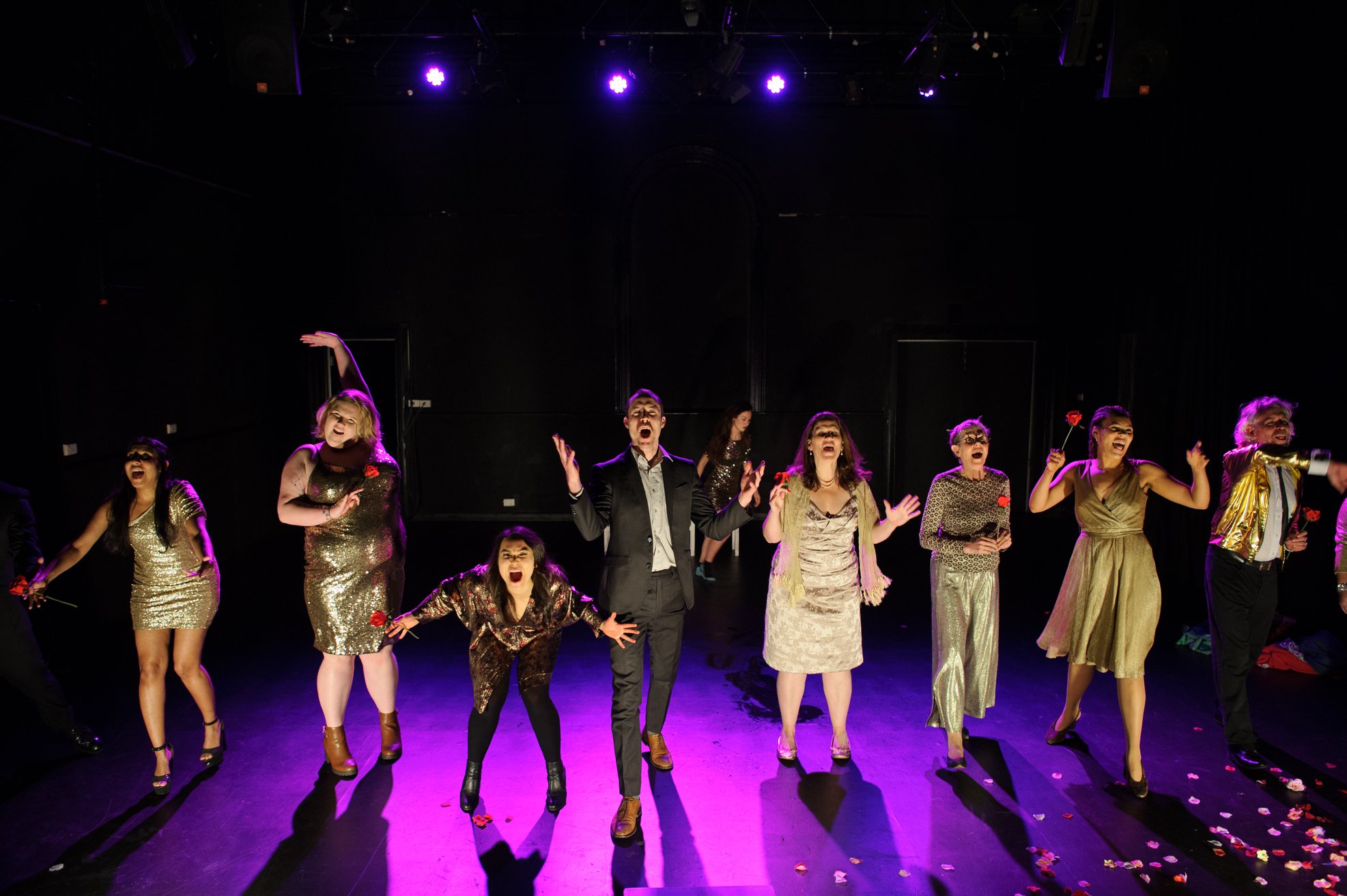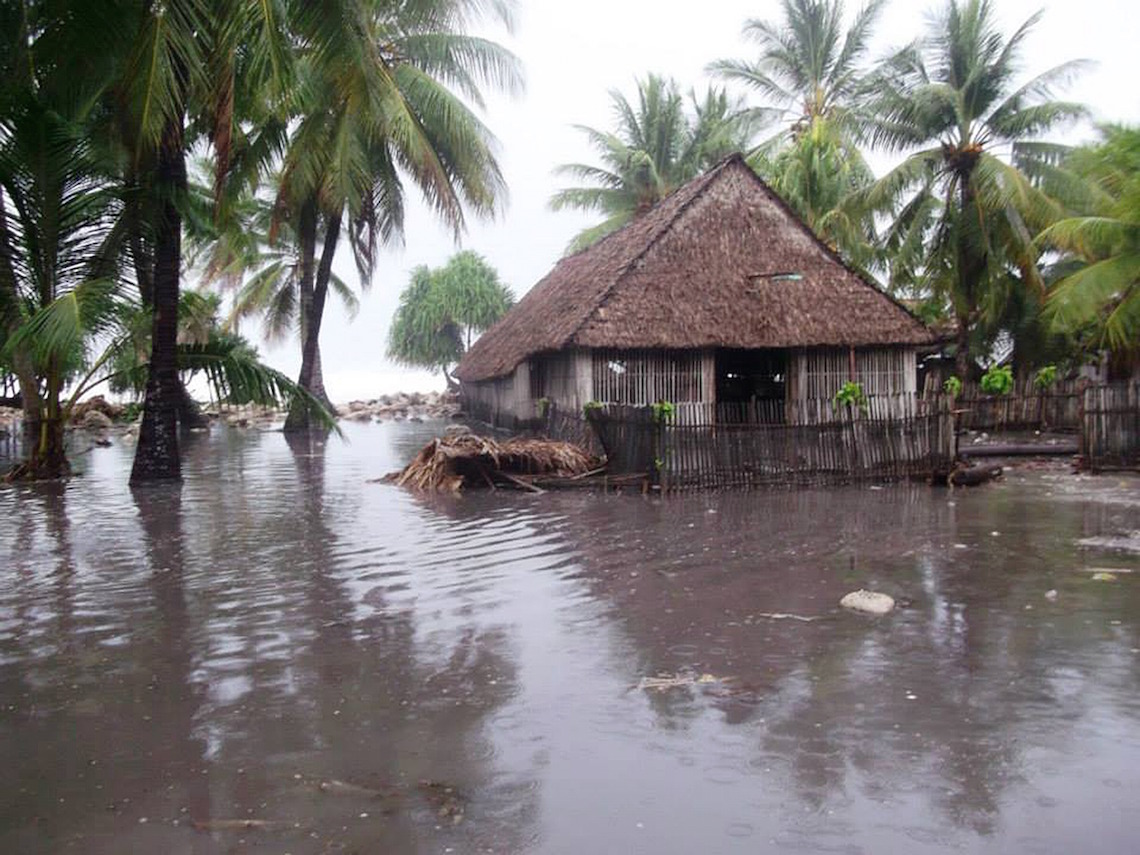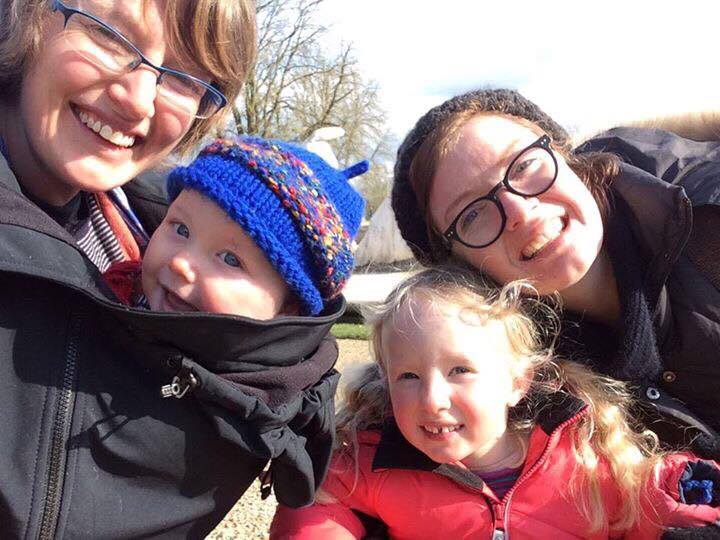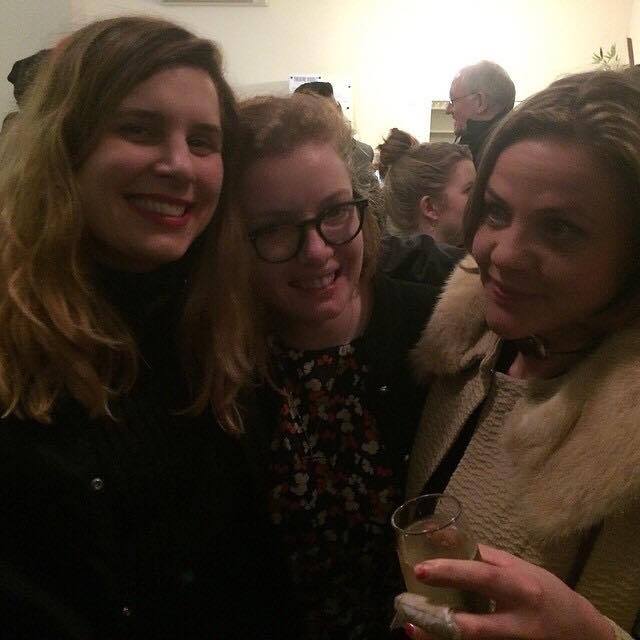When I came to record audience conversations of F., (my first in a long time, apologies) my SD card was full of a previous conversation:
Interlude 1: Setting, an outdoor courtyard of a Geelong cafe. A confused 90-year-old sits with her granddaughter.
Her: What’s that?
Me: It’s a microphone recorder.
Her: Oh really.
Me: Yeah. You were telling me such good stories on the –
Her: Pardon?
Me: You were telling me such good stories in the car on the way here so I thought –
Her: Was I?
Me: You were.
Her: I don’t think I was.
So my SD card was full the night I recorded with random audience members for F. and I only recorded two incomplete conversations, presented here with interludes from my grandmother.
Know that this production resulted in some beautiful conversations, not all of which I was able to capture. Know that I feel privileged to have had these conversations with these articulate young people, reflecting on growing up with the internet in the 21st Century. Know that I was thrilled to have been so provoked and unsettled by the teenagers of Riot Stage and that it was a delight to see them owning their voices and stories. Know too that my grandmother would never in a million years understand any of it.
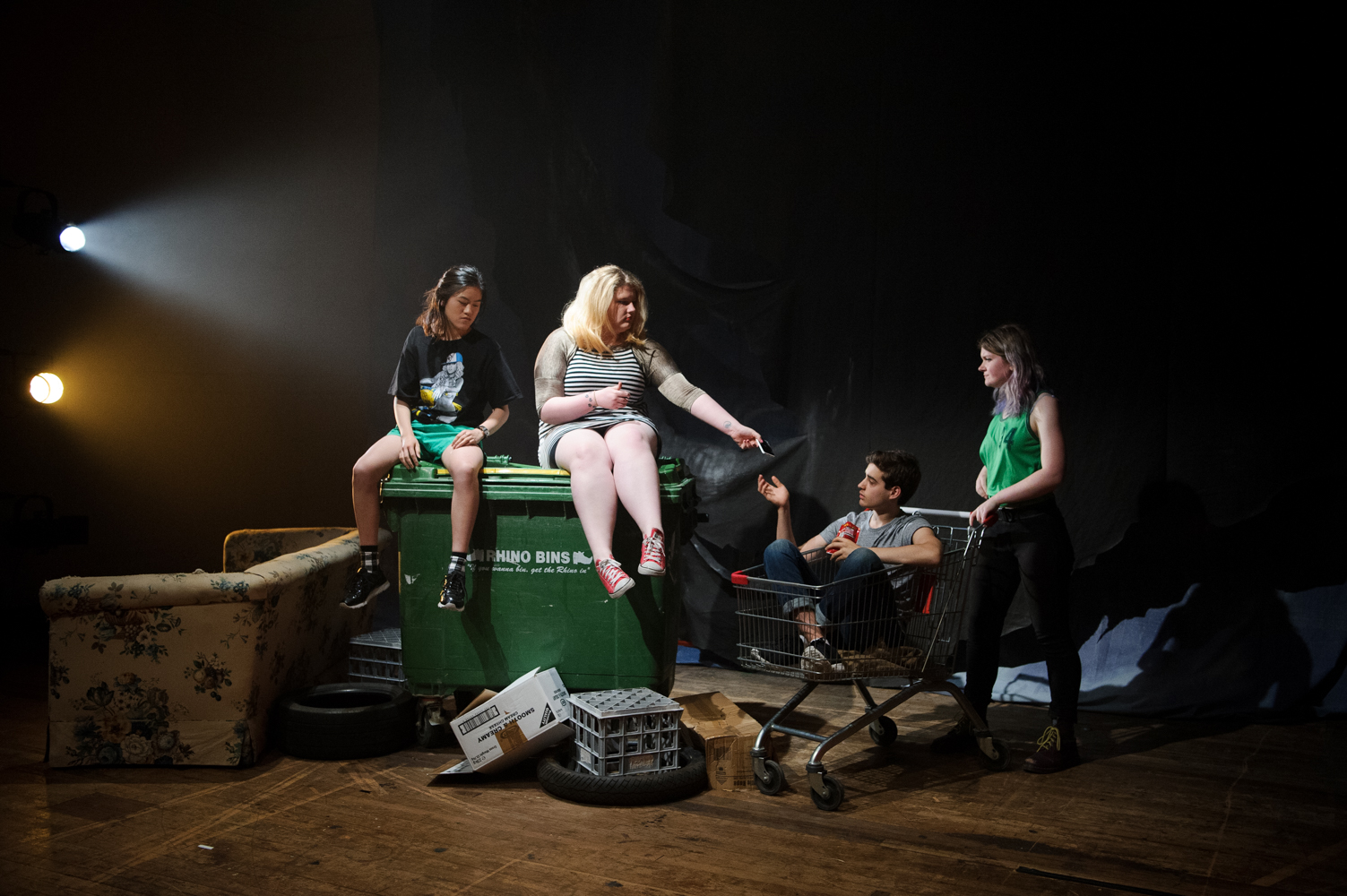
Photo: Sarah Walker
Conversation 1: Setting, sitting on the floor of a corridor outside the theatre. Two eighteen-year-olds, who have never seen theatre like this before, sit holding hands. They have just finished year twelve exams.
Me: So what just happened in there? What was there?
Nelly: That was confusing at times!
Me: What do you think happened to you?
Zac: Just discussing issues sort of facing teenagers and that. Yeah. And just the chaotic vibe of it and yeah it’s… you can sort of relate to it I suppose. Um. Yeah.
Nelly: We’ve seen school musicals and stuff but it’s not like that at all. Our school plays are like Pride and Prejudice and stuff. This is like, really different.
Zac: Seems much more relevant and real I suppose. Much more relatable than the perfect pictures that TV and that paint.
Me: Big question but how do you feel about the internet? It’s our whole lives, I know.
Zac: Me and her sort of started being friends on the internet. We were in the same class but I was really shy. I just won’t talk but online I was really loud.
Nelly: Like he had two personalities.
Me: So if it was thirty years ago, when introductions were all walking up to someone and asking them to dance at a mixer, you’d never have talked.
Zac: Nup. That’s why the Internet has a lot of negative aspects but at the same time, it’s very useful in connecting people. We wouldn’t have this connection without it.
End conversation 1.

Photo: Sarah Walker
Interlude:
Me: You were talking about Nelson and your uncles playing cricket.
Her: Was I?
Me: Yeah. Did granddad play any sport?
Her: Oh… He usually played golf.
Long pause.
Me: Did you ever try golf.
Her: I don’t think so.
Me: Those sons of your must have got it from somewhere.
Her: Do they play golf?
Conversation 2: Setting, a square of lawn outside the venue. My legs are pink with grass allergy and will continue to sting for an hour afterwards.
Me: What happened to you in there?
Jules: I think I was reminded of the distance between being a young adult and being a teenager. And what it’s like to be a teenager. It’s amazing how much you forget even in a couple of years. I’m twenty-two and it was amazing just to be like, there’s definitely –
A parade of motorbikes roar past.
Me: We’ll give them a moment.
More motorbikes.
Jules: Okay. Rude.
We wait. They pass. We resume.
Jules: I just thought it was a really beautiful representation of being a teenager.
Doug: To me it was sort of this mish-mash collection of snippets, just reminding you of what it’s like to be a teenager. And I mean, I’m 19 so I’m closer to being that teenager but there’s still that incredible distance that forms when you hit uni and you leave that whole high school mentality. I think this did a really good job of reminding me of that and how it feels to be in that claustrophobic environment. It reminds you of all the weird things teenagers do and how their brains work.
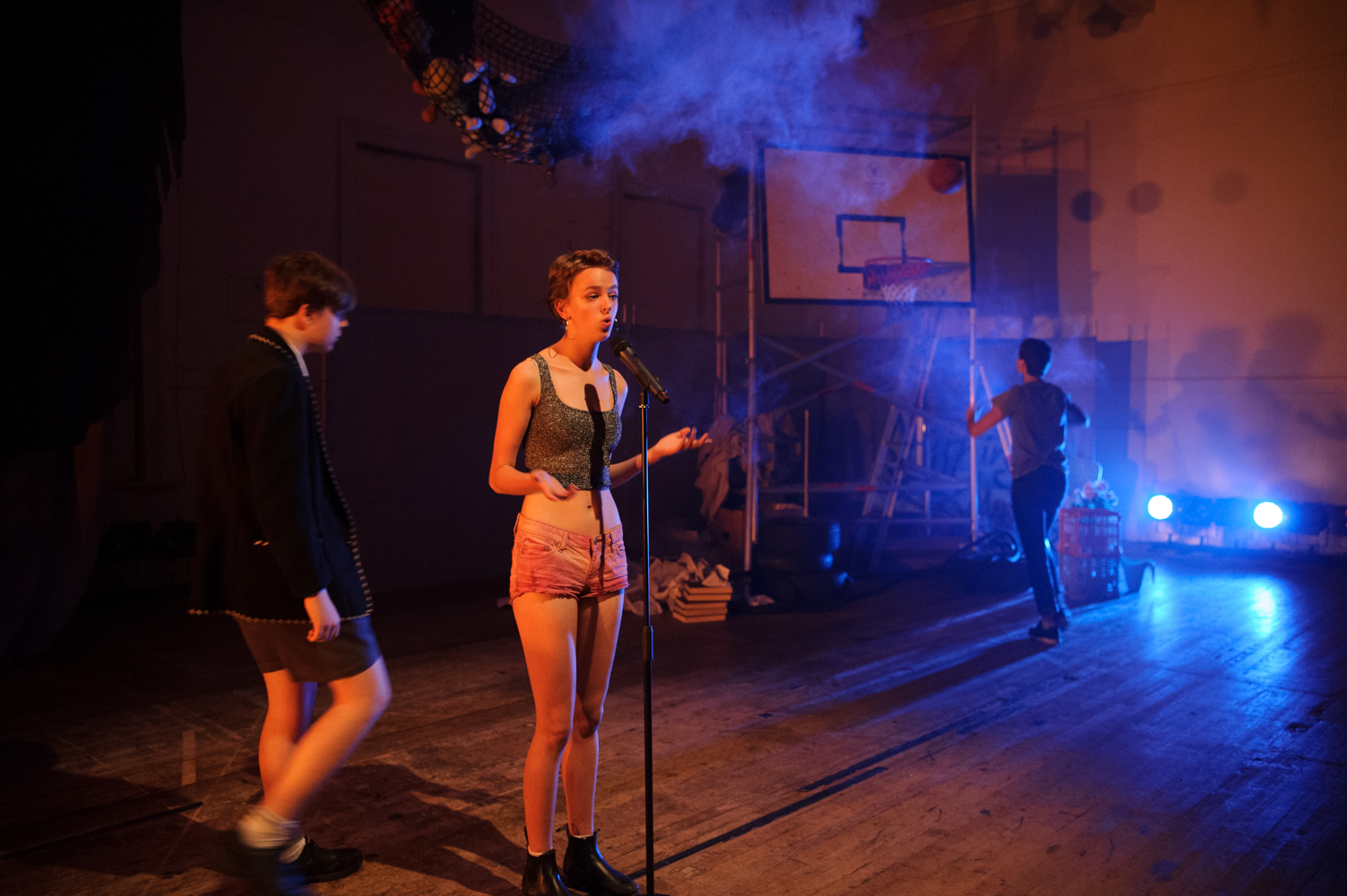
Photo: Sarah Walker
When I was a sixteen-year-old I didn’t know how to express myself very well. It was a lot like in the show, you’d have characters just switching topics almost on a dime, just talking awkwardly. It was a lot like that. Now I find it a lot easier to structure what I’m trying to say and separate my thoughts.
Me: Could you express yourself better online?
Doug: Yeah, I think so. It was useful because it sort of gave me time to think about what I was trying to say.
Jules: It is this weird Schrodinger’s Cat thing of being heard and not heard. You can scream into the void but there might be someone listening. If you feel like you can’t express yourself properly at high school or with you friends or family, you end up with this strange sort of dynamic where you simultaneously might have someone hearing you and understanding you and saying ‘it’s gonna be okay’ but you also have this freedom just to say whatever you want because there might not be anyone listening. It is a strange dynamic.
Interlude:
Me: When you were a teenager, working on the farm. What did you do for fun?
Her: I think they took me shopping with them. Thursday was a shopping day. I don’t know if it was much fun.
Me: Did you like reading?
Her: I never did very much reading.
Me: What was your favourite thing about Granddad?
Her: Granddad?
Me: My granddad.
Her: Your granddad? He was away at the First World War, granddad. He didn’t have a very happy life afterwards.
Me: That’s your dad? Is there anything you remember doing with him?
Her: No, I don’t think so.

Photo: Sarah Walker
Conversation 2:
Me: I really loved the scene early on: the two boys chatting with the text behind them and just how understated it was: ‘I came out to my parents, we had tacos,’ that kind of thing. I’m 30 and this was a great reminder how, in such a short time, what was a big deal has changed and become a regular part of adolescence. Still, there are people for whom coming out is a big deal and is traumatic and has frightening and very real consequences, but for a lot of young gay people, that’s not the toughest part of being a teenager. The main difficulty for that teenager was just being a teenager: being caught in that land between autonomy/self-realisation and that childhood dependence on others.
Doug: I remember when I came out to my mum and she just turned to me and said ‘oh I know’. I was like ‘oh okay.’ I was fifteen or sixteen. I’d been expecting more drama I guess. She’d always been very accepting but yeah it was… odd.
I think the scene that’s sticking with me the most is with the two girls that were sitting watching porn and just that raw discussion of sexuality and their vaginas. When you’re a teenager with a trusted friend and you haven’t really explored these things before, you just talk about it. She was talking about how she wanted to change how her vagina looked and stuff – that really introspective stuff that adults are a lot less likely to just let out because it comes rooted in insecurities and things like that. I used to talk a lot about things I didn’t feel great about. Mostly to close friends, a lot of them I only knew through the Internet, which I think really helped. Like, I don’t really know this person, so it won’t matter as much if I just talk openly with them.
Me: The first time I saw porn I was talking to this guy a couple of years older than me on Nine MSN. He was this gay guy –
Jules and Doug: Oh MSN!
Me: And he was like ‘this is the kind of guys I like’ and he sent me this link. Suddenly my screen was covered in all these naked women. I worked out ages later that I must have got a pop up but at the time I was like ‘he’s a gay guy, he would know what men are’ so I was looking at them going ‘so these are men… so he likes men with make up and… boobs and small thingies’. They were so clearly female bodies. Very naked, very female. But I didn’t have any idea what gender they were. The colour scheme was not what I associated with naked women. It was all pink and gold and shiny and slippery and just… didn’t look like the naked women I’d seen in my life. And I wrote to the guy and was like ‘this is the kind of men you like?’ And he was like ‘yeah’ and I was like ‘men with boobs?’ and he was like ‘what? Men like the men I sent you!’ We worked it out after a while. But that was my first experience of Internet porn: just not even knowing what I was looking at.

Photo: Sarah Walker
Doug: I got tricked. This was in primary school. It was one of those gags that was going around. People were saying ‘if you go to redtube.com, it is like youtube but it’s in HD!’ So I hopped on our family computer that was out in the living room at the time, typed in redtube.com and up came these… not youtube videos. It took me a second. I scanned the page and I started scrolling down and I was about eight or nine, I think. I’d just been given permission to use the computer –
Me: And you blew it, straight away.
Doug: I blew it straight away! I scrolled down and I saw all these images that I didn’t really understand. My dad came over and understandably he was sort of ‘what are you doing?’ I told him that I’d been told this was HD but it didn’t look like the youtube videos I normally watched. He closed out of the browser and we had a little talk about what porn is. I think he just said ‘it’s videos of people having sex on the internet’. My parents never glossed over things. They never talked about genitals with weird words, it was always ‘penis’ and ‘vagina’. I think I was probably four or five when I asked where babies came from and they just straight up told me.
Me: I remember asking what ‘cunt’ was and my mother said ‘it’s another word for vagina’ in such a matter of fact way that I thought for years it was a more polite word – like the medical terminology! Not that it came up in conversation because it didn’t but yeah, I was like ‘oh, that’s the grown up way to talk about vaginas! Good to know!’
Interlude:
Me: Look at that. They’ve got a chandelier hanging in the greenery. Looks like you might be able to find some monkeys here.
Her: What’s that?
Me: I was just saying, it looks like you might be able to find some monkeys here.
Her: Oh.
Silence. Knives and forks clatter.
Me: What are you most proud of?
Her: Oh. (A long pause.) I guess… most proud of family life. Mum and dad and the family. Mum kept the family together really. Dad was good too but… aftermath of the war, I think. He drank a lot of alcohol which was a worry, not only to mum and myself but the rest of us.
Me: Was that part of the reason you never drunk alcohol?
Her: I suppose it might have been part of it but I never took a liking to it anyway. Anything I tasted I never liked. You wonder how anyone could ever like it.
Conversation 2:
Me: I think the scene that really wrecked me was the scene with the two actors on opposite sides of the stage. The first night I was sitting with two straight men and they were watching the boy and I was watching the girl. I really noticed the different ways our heads were turned. I think that is a scene that is so heartbreaking for both characters but you do experience it very differently as a male or female. I don’t know. And I don’t know how different it is as a gay man either. I think a lot of heterosexual men move through the world with this deep fear of taking advantage of a woman.
Jules: I didn’t know where look: whether I should watch one of them, whether I should not watch any of them and just listen. I thought it was really interesting that they chose to make it very dubious as to what actually happened but very clear that she didn’t want it. I feel that that’s a situation that happens all the time and far too –
End conversation 2, with a full SD card.

Photo: Sarah Walker
Interlude:
Her: We had two or three horses we used to ride. Might have been more than that at times. The neighbours – they lived four or five miles up towards the boarder and eh – they had a lot of shetlands. They were half broken-in and they used to pass them on to us to ride. Some of them were very good to ride but others were very cheeky.
Me: Yeah. Yeah, that sounds hard work.
Her: I forget how many we would have ridden all together.
Waiter: Spinach and feta borek?
Me: That’s me. And the lamb is here.
Waiter: And would you like a knife and fork with that one?
Me: Would you like a knife and fork, grandma?
Her: No. Thank you.
Waiter leaves. Silence.
Her: A knife and fork would be handy.
End interlude.
F. is by Riot Stage and was presented as part of the Poppy Seed Theatre Festival of 2016. It was directed by Katrina Cornwell, written by Morgan Rose, performed by a cast ranging from 15 to 19.








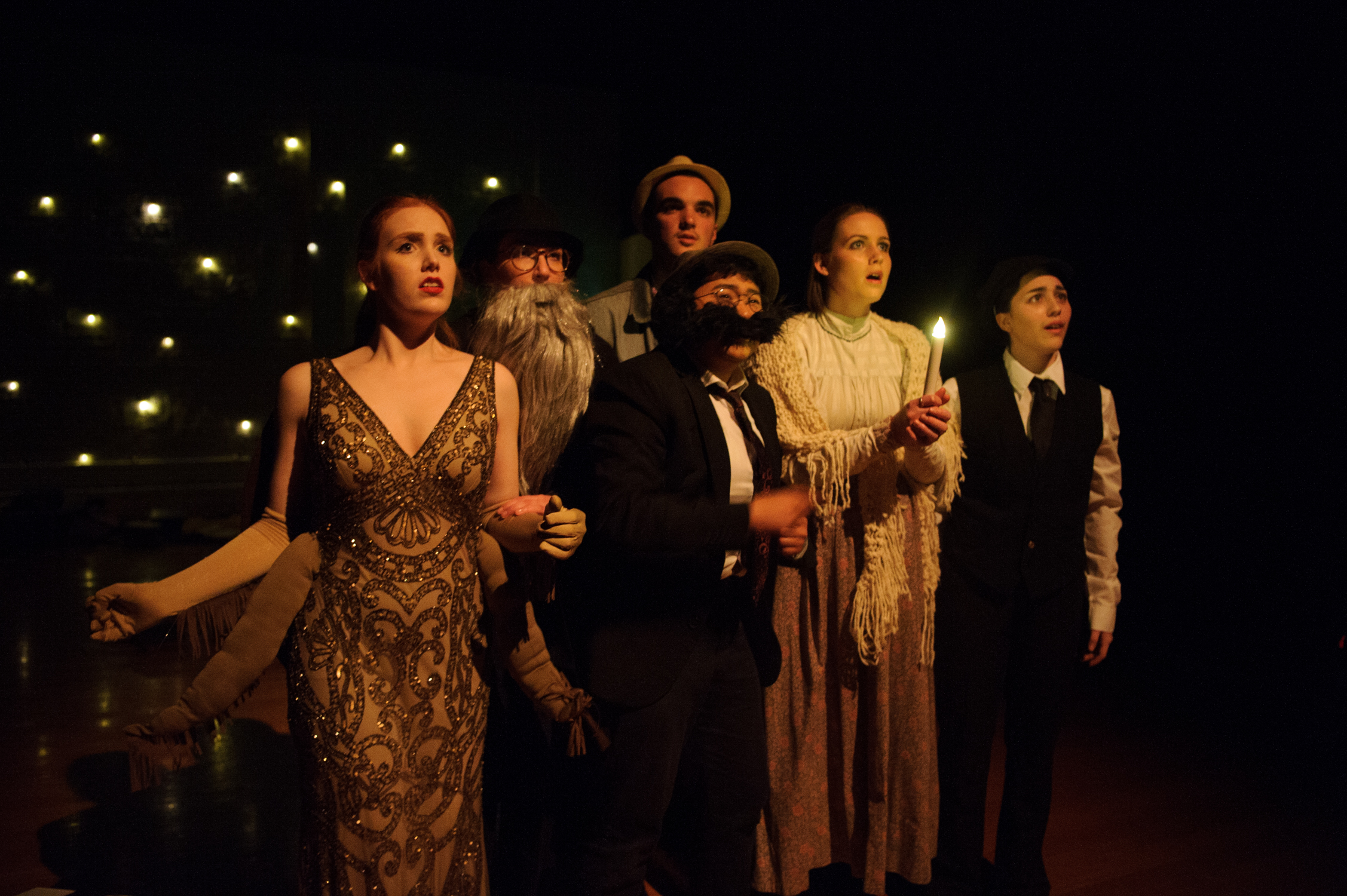




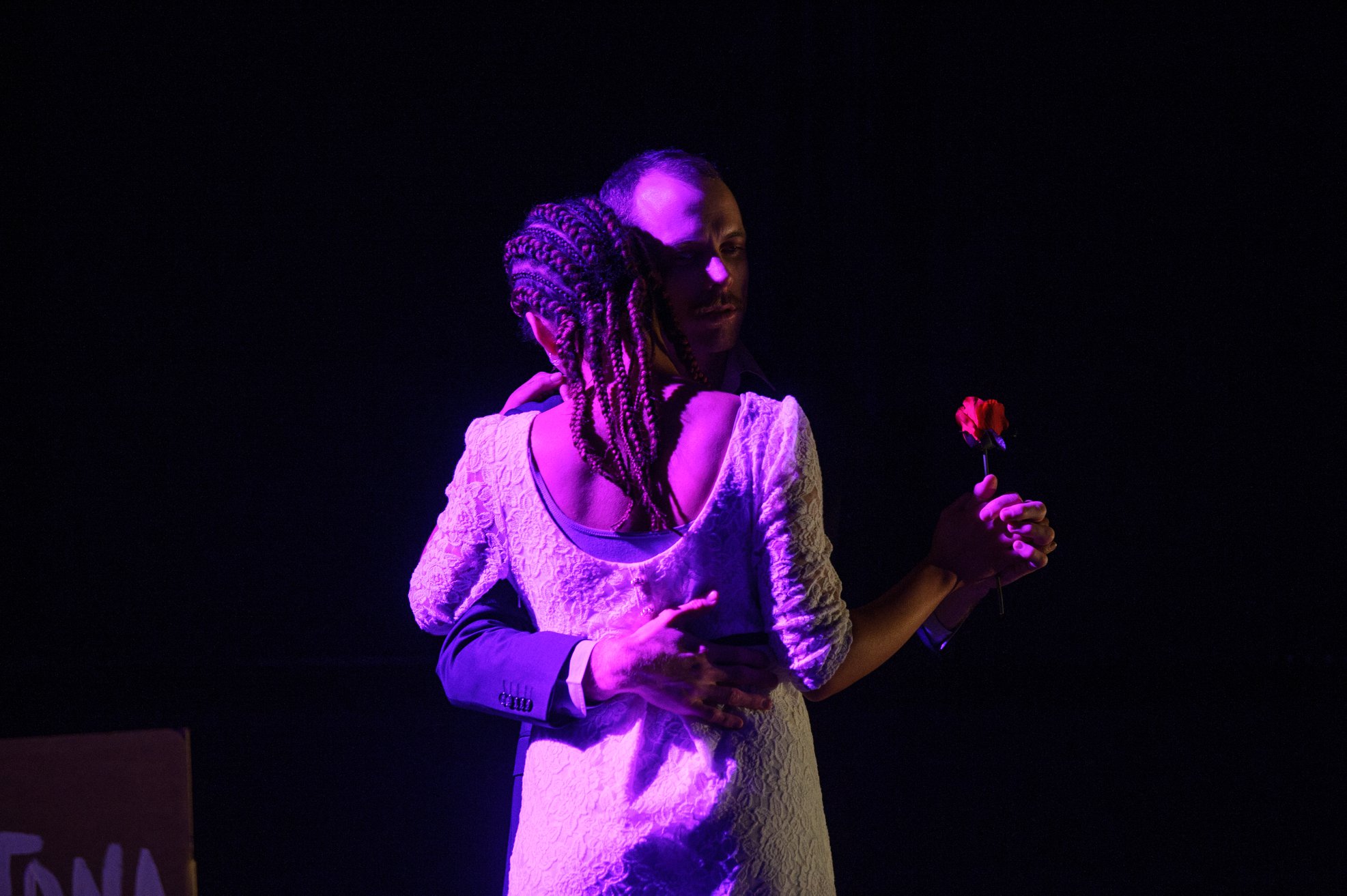
 “Habitualisation devours work, clothes, furniture, one’s wife, and the fear of war… and art exists that one may recover the sensation of life; it exists to make the stone stony. The purpose of art is to impart the sensation of things as they are perceived and not as they are known. “ Viktor Shklovski
“Habitualisation devours work, clothes, furniture, one’s wife, and the fear of war… and art exists that one may recover the sensation of life; it exists to make the stone stony. The purpose of art is to impart the sensation of things as they are perceived and not as they are known. “ Viktor Shklovski